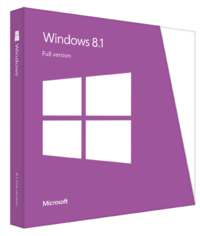 Microsoft announced that it will charge full price for Windows 8.1 upgrades from Windows XP, Vista or Windows 7. Customers already running Windows 8, however, will receive the update — which is slated to hit the Windows Store Oct. 17 and reach retail Oct. 18 — free of charge.
Microsoft announced that it will charge full price for Windows 8.1 upgrades from Windows XP, Vista or Windows 7. Customers already running Windows 8, however, will receive the update — which is slated to hit the Windows Store Oct. 17 and reach retail Oct. 18 — free of charge.
Downloads or retail packages containing a DVD of Windows 8.1 will cost $119.99, said Microsoft spokesman Brandon LeBlanc in a post to a company blog Tuesday. The more capable Windows 8.1 Pro will be priced at $199.99. Those prices are identical to the current costs of Windows 8 and Windows 8 Pro for users who want to upgrade from an older edition of Windows. itvoice
The lack of promotional pricing for Windows 8.1 was in stark contrast to Microsoft’s marketing of Windows 8 last fall. Then, the Redmond, Wash. company heavily discounted upgrades to Windows 8 Pro, selling them for just $39.99. The promotion ran from the Oct. 26, 2012 launch of the radically overhauled operating system to Jan. 31, 2013.
![]() It was after the latter date that Microsoft raised prices to the $119.99 and $199.99 marks. Wes Miller, an analyst with Kirkland, Wash.-based Directions on Microsoft, noted the switch in sales strategy by Microsoft. “I don’t think [upgrades] matter quite as much to Microsoft now,” he said. “Windows 8 was really focused on consumers and upgraders,” he added, referring to last year’s launch and discounts. “Windows 8.1 seems more focused on businesses.”
It was after the latter date that Microsoft raised prices to the $119.99 and $199.99 marks. Wes Miller, an analyst with Kirkland, Wash.-based Directions on Microsoft, noted the switch in sales strategy by Microsoft. “I don’t think [upgrades] matter quite as much to Microsoft now,” he said. “Windows 8 was really focused on consumers and upgraders,” he added, referring to last year’s launch and discounts. “Windows 8.1 seems more focused on businesses.”
He cited several features, including Workplace Join — which lets enterprise IT administrators fine-tune what resources a Windows 8.1 device can access — as evidence of Windows 8.1’s attempt to lure businesses into upgrading.
As for consumers still running Windows 7, the older Vista, or the soon-to-retire Methuselah, Windows XP, Miller said Microsoft hoped those customers would buy a new device instead of upgrading. The high prices Microsoft’s maintaining for Windows 8.1 supports that reasoning.
“There should be a better selection of x86 tablets later this year, and Microsoft will be hoping that [consumers] buy a new tablet rather than try to upgrade from Windows 7,” said Miller.
Historically, Microsoft has generated the bulk of its Windows revenue from sales to OEMs, or “original equipment manufacturers,” the computer makers like Lenovo, Hewlett-Packard, Dell and others that pre-load the OS onto new machines. Retail upgrades typically contribute only small amounts to the company’s bottom line.
Another change from last year in announcement was Microsoft’s declaration that Windows 8.1 is not suitable for Windows XP or Vista.
“Windows 8.1 is not designed for installation on devices running Windows XP or Windows Vista,” said LeBlanc, who also said an upgrade from those older editions was “not recommended.”
In 2012, Microsoft promoted Windows 8 as a suitable upgrade not only for PCs running 2009’s Windows 7, but also 2007’s Vista and even 2001’s XP.
The price of Windows 8.1 Pro Pack — an after-device-purchase upgrade that bumps Windows 8.1 to Windows 8.1 Pro — will be $99.99, the same price Microsoft’s charged for the similar Windows 8 Pro Pack since Jan. 31.





